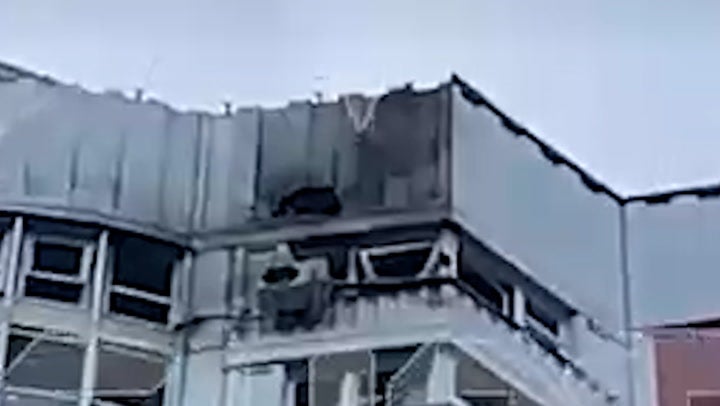
Russia suffered a surprise attack in the early hours of Tuesday morning when as many as 30 drones zeroed in on Moscow, bringing Vladimir Putin’s Ukraine war to his own doorstep after 15 months of bloody conflict.
The country’s defence ministry has only admitted to sighting eight drones, all of which it says were shot down, causing only minimal damage and injuring just two people.
Even if that is true, the incident follows an assault on the Kremlin earlier this month and creates a problem for Mr Putin, who has so far largely been able to shield Russian citizens from the realities of the war.
Life has been allowed to proceed as normal in the capital but the sight of debris hitting some of the city’s most prestigious areas – including the grand Soviet-era Leninsky Prospekt Avenue and the Odintsovsky District, in which the wealthy elite, including Mr Putin, have residences – cannot have gone unnoticed.
Residents in southwestern Moscow reported hearing loud bangs at between 2am and 3am BST on Tuesday morning, followed by the smell of petrol, while some filmed the unmanned devices being downed in smoke over the city skyline.
“It is, of course, obvious that this is an attack by the Kyiv regime,” Kremlin spokesman Dmitry Peskov told reporters. “And this must be absolutely clearly understood.”
Kyiv has itself been under siege from drone strikes by the aggressor in recent days, but Ukrainian presidential adviser Mykhailo Podolyak denied his side was behind the attack, adding drolly: “Of course, we are pleased to watch and predict an increase in the number of attacks.”
Mr Putin is said to have been briefed early on Tuesday about the strikes and continued working in the Kremlin, later saying only that the episode was intended to “intimidate” and “clearly a sign of terrorist activity”.
He will surely respond militarily, even if his initial instinct is to downplay the extent of the damage.
Writing on Telegram, Russian political analyst Tatiana Stanovaya, a senior fellow at the Carnegie Russia Eurasia Center, said the president’s eerie calm was about projecting the impression that he “isn’t afraid” because his control is “built on the idea that has been voiced more than once … [that Russians are] a patient people who will understand everything and endure everything”.
Mr Putin has so far left much of the sabre-rattling following the attack to others, such as lawmaker Alexander Khinshtein, who warned his countrymen: “The sabotage and terrorist attacks of Ukraine will only increase. It is necessary to radically strengthen defence and security measures, especially in terms of countering drones.”
Another politician, Andrei Kartapolov, told local media the attack was a Ukrainian endeavour “designed to create a wave of panic”.

Speaking to The Independent, Tim White, a Ukraine expert and journalist, commented: “Putin’s only response is violence, we’ve seen it time and time again.
“The problem is how much of his arsenal is left? I strongly suspect there was another large shipment of drones from Iran recently, hence the big uptick in drone strikes.
“But I believe this tactic is primarily to locate Ukraine’s air defence systems, especially its Patriot [missile] systems, and get Ukraine to exhaust its own air defence missile stocks. The Kremlin is not able to manufacture missiles as quickly as it is using them.”
Among the residents of Moscow, the episode is likely only to entrench existing attitudes towards the war, Mr White said, noting the stranglehold exerted by state media.
“I think opinion in Russia will be even more anti-Western rather than anti-Putin,” he said.
“The absolute control of the media ensures most people believe the indoctrination, wrongfully describing Ukraine as a nation of Nazis.”
That observation has already been borne out, with one woman, Natalia, 59, telling news agency Reuters: “The Kyiv regime is already crossing all the lines. This is very sad, especially since they are directing these drones at residential buildings, at the city, at civilians, where there are no military facilities.”
More surprisingly, another resident told the same outlet: “All of this is because of our ruler. It’s no surprise it’s bounced back to here.”
As for what might happen next, Mr White is in little doubt that there will be a retaliation, perhaps targeting a region the Kremlin had expected to welcome its “special military operation” with open arms.
“My best guess is that there will be a strike on a city, masquerading as a military hit, with what we describe as ‘plausible deniability’,” he said.
“But it won’t be Kyiv, which is too well protected judging by the last month’s bombardment. Lviv is a target, but more at risk is likely to be Odesa or Mykolaiv in the south. These are areas that previously spoke almost exclusively Russian and Putin believed would welcome his illegal invasion.”
The Russian foreign ministry has already made threats to that effect, declaring: “Russia reserves the right to take the harshest possible measures in response to the terrorist attacks by the Kyiv regime.”







